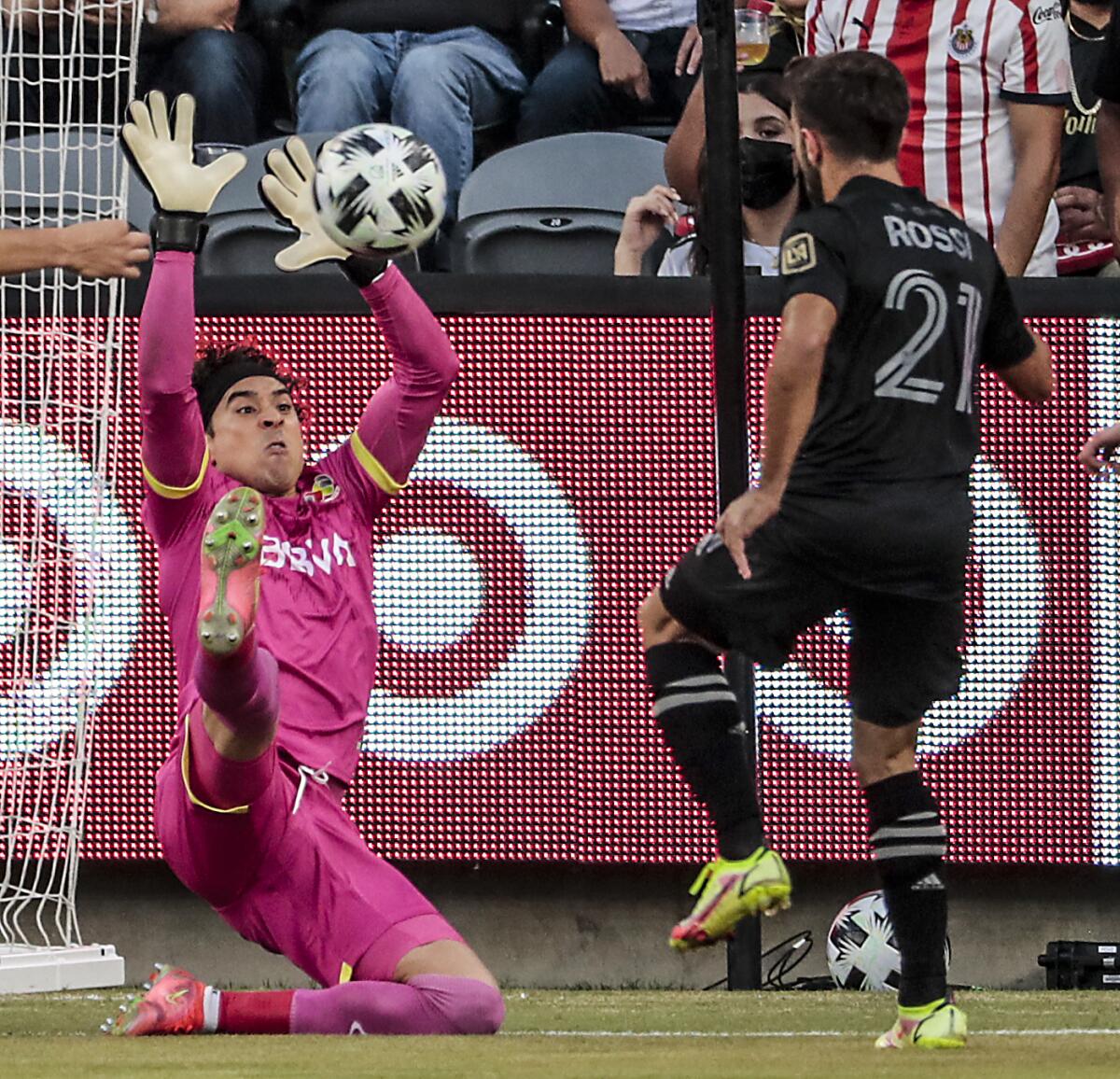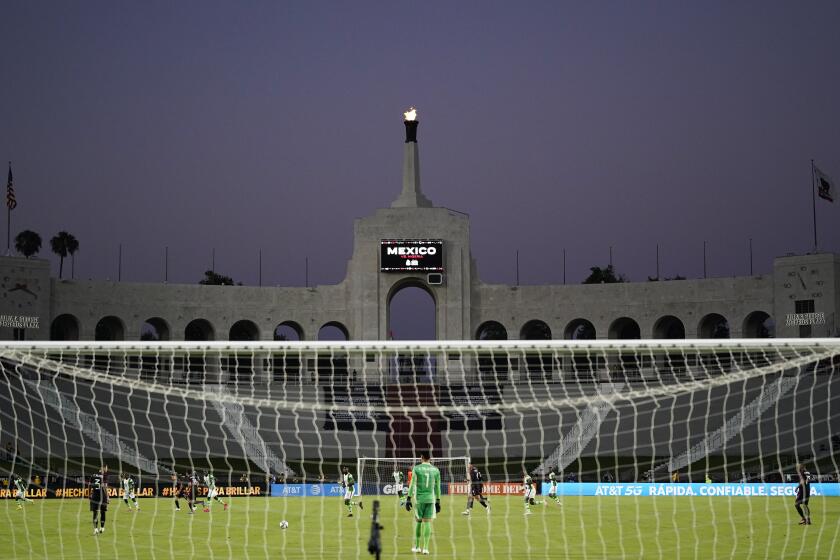Liga MX and MLS take next step in partnership with World Cup-style tournament

- Share via
The growing partnership between MLS and Mexico’s Liga MX has given birth to two competitive tournaments and a unique All-Star game in the last four years, sparking rumors that a merger could be coming soon. On Tuesday, the two leagues revealed what they’ve really been working on: an annual, monthlong, World Cup-style tournament involving all 47 teams from the two leagues to debut in 2023.
The competition, an expanded and reimagined version of the three -year-old Leagues Cup, will be the first major international tournament to feature every team from two top-tier leagues and will require both MLS and Liga MX to pause their respective regular seasons for a month each year.
The creation of the tournament was announced by MLS Commissioner Don Garber and Liga MX President Mikel Arriola at a news conference in New York City. The competition will be sanctioned by CONCACAF, the governing body for soccer in North America, Central America and the Caribbean, and its winner will earn automatic qualification to the CONCACAF Champions League round of 16. The second- and third-place finishers will qualify for the opening round of the CCL.
“That’s not a merger of the two leagues, but it’s probably the next-best thing because all teams will exclusively be playing in a common competition for a month,” said Steven Bank, the Paul Hastings professor of business law at UCLA and an expert on international soccer. “It also comes at a time when the TV sports schedule is pretty weak in the U.S. and globally in a non-Olympic or [men’s] World Cup summer, which likely will encourage media partners and sponsors to highlight these games.”
The new tournament is the latest in a series of ambitious endeavors involving the two leagues. In addition to the original Leagues Cup, the final of which will match the Seattle Sounders against Mexico’s Club León on Wednesday in Las Vegas, there is the four-year-old Campeones Cup. And last month, teams from both sides of the border met for the first time in a series of All-Star game activities at Banc of California Stadium.
Several questions remain to be answered, chief among them the status of the two leagues’ domestic schedules and whether rosters will be expanded to deal with the crush of additional games.
U.S. Soccer urged the men’s and women’s national teams to sign the same CBA and split prize money evenly, but that would represent a pay cut for the USWNT and they’re not on board.
The eight-month, 34-game MLS schedule has grown increasingly crowded in recent years with the U.S. Open Cup, the two additional Liga MX competitions, the MLS playoffs and Champions League. The Liga MX season, which consists of two 17-game tournaments plus playoffs, is equally congested. Many players from both leagues also take part in international competitions, such as the CONCACAF Gold Cup, the Nations League and World Cup qualifying, appearing in more than 50 games in a calendar year.
Representatives from the majority of teams in the two leagues met at California Science Center in Exposition Park on the eve of the All-Star game last month to discuss various cooperative ideas, including the expanded Leagues Cup.
For MLS, which has begun negotiations for a new TV deal, the growing partnership with Liga MX provides exposure for passionate Mexican fans here and in Mexico. The All-Star game proved that it works with 1.6 million viewers tuning in for the game in Mexico, more than double the previous highest audience for an MLS All-Star game.
For Liga MX, closer relations with MLS gives it access to the lucrative U.S. market.
“The two markets are merged together now,” said Martin Hollaender, chief financial officer for Orlegi Sports, which owns Liga MX franchises in Torreón and Guadalajara, and recently opened a merchandizing and business office in Southern California. “It would be natural for us to look for something new in the U.S. We can create quite an interesting product now with the MLS. We could have a more global reach.”
The timing is also right, coming during the run-up to the 2026 World Cup, which will be hosted jointly by the U.S., Mexico and Canada. But the expanded Leagues Cup also risks being another embarrassment for MLS on the field, where the two leagues are far from equal.
Although MLS won the first All-Star game in penalty kicks, the league hasn’t won the CONCACAF Champions League — the region’s most important club competition — since 2000. Liga MX teams have won 17 of the 19 tournaments since then, with an MLS club reaching the final just four times in that span. Closing that gap likely will require increased spending by MLS teams, who are limited to a payroll of $4.9 million with exceptions for designated players, salaries funded with allocation money and other carveouts, such as the U-22 initiative.
NBC Sports is bringing its traveling studio soccer show, ‘Premier League Mornings Live,’ to Los Angeles for a two-day fan festival outside the Coliseum.
Liga MX does not have a salary cap.
“The question is whether MLS teams will view the stakes as worthy of prioritizing the competition from a wins and losses perspective,” Bank said. “The format suggests that it could be a lot of games in a short period, which might affect the ability and motivation of MLS teams with relatively short benches of strong players. I tend to think MLS needs to add something to the kitty for its teams — such as additional roster size and salary budget for all teams coming into the season and something additional for winners that could be used in the secondary transfer window or the winter window — to both bolster MLS’ performance and provide adequate incentives.
“Nevertheless, there should be more excitement and commitment than the normal U.S. Open Cup or CCL competitions simply because of the exclusive window for the competition. It’s certainly promising.”










